
Cold Chicken and Heated Arguments
There’s a moment after a South African funeral when the real ceremony begins. Not in the church, not at the gravesite. After the priest has said his final prayer and the tombstone has settled into the red, sunbaked earth, people drift toward the house. The air is heavy with silence and simmering heat, the kind of humidity that makes dresses stick and emotions rise. Somewhere inside, the food has already been laid out, warm pap that’s starting to congeal at the edges, chicken that’s gone cold and shiny, the occasional bowl of beetroot that stains the serving spoon purple. And standing in front of it all is a quiet expectation. Eat. Speak. Stay a while. But everyone knows it’s not just about the food.
Funerals in South Africa, especially in small towns and close-knit communities, are a strange brew of ritual, performance, and unresolved history. They’re supposed to be about the person who has passed. But often, they end up being about the people left behind, and the things they haven’t said to each other in years.
The tension starts in small ways. Someone side-eyes someone else over the sugar in the tea. A cousin mutters about the cheapness of the casket. An aunt counts how many chairs were hired and who paid. Everyone’s got a theory, a tally sheet, and a long memory. Old wounds, like unpaid lobola or land disputes, get stirred up in the kitchen next to the pot of chakalaka. The grief has a script, but the drama doesn’t.
One woman cries too loudly. Another doesn’t cry at all. A man in a plastic chair starts to shout, not out of sorrow, but because someone said something about his brother, the deceased, and now we’re all remembering that time in ’98 when things got ugly at the family Christmas. In the living room, the younger generation stares at their phones, texting apologies they don’t mean to people they haven’t seen since the last family death. The elders look on with that worn, expressionless mask that hides equal parts wisdom and exhaustion.
Outside, the smokers form a half-circle near the gate. These are the unofficial commentators. They’ve seen this all before. “The chicken’s dry,” one says. “She always did have a heavy hand with the stove.” Another snorts. “Better dry chicken than dry hearts.” They laugh, but not kindly.
There’s a unique weight to South African funerals that isn’t easy to explain. They are not just a goodbye, they are a reset. A reckoning. A forced gathering of people who often go out of their way to avoid one another. In death, the village gathers. But what it gathers isn’t just grief, it’s gossip, guilt, memory, and ego. Every hug is also a scan, who’s gained weight, who’s gained money, who’s still bitter, and who brought the best-looking car.
In many families, especially where economic lines divide siblings and cousins, a funeral becomes the site of invisible hierarchies. Who contributed the most financially becomes a weaponized fact. The aunt who brought two trays of chicken makes sure everyone knows it. The uncle who arrived late and empty-handed will be remembered for exactly that. People whisper that so-and-so didn’t come to the hospital when the deceased was sick. Others nod, lips tight, eyes rolling. “He only shows up for the coffin,” someone mutters. That phrase cuts deeper than the funeral hymns ever could.
 Children run between legs and plastic chairs, unaware that the house is straining under more than the weight of grief. Dogs bark at every new arrival. Somewhere in a back room, a cousin finally loses her temper and shouts that she’s not anyone’s maid, then slams the kitchen door hard enough to make the plates rattle. No one blinks. That’s just how these days go.
Children run between legs and plastic chairs, unaware that the house is straining under more than the weight of grief. Dogs bark at every new arrival. Somewhere in a back room, a cousin finally loses her temper and shouts that she’s not anyone’s maid, then slams the kitchen door hard enough to make the plates rattle. No one blinks. That’s just how these days go.
In some ways, funerals are the great emotional equaliser. They expose who’s still carrying what. That woman crying loudly? It’s not just about the person in the coffin, it’s about the father who left, the cousin who stole, the job that never came. The man pacing outside on the phone? He’s not taking work calls, he’s avoiding sitting at a table with a brother he hasn’t spoken to in ten years. Everything is personal. Nothing is forgotten.
But strangely, there’s beauty here too. Between the drama and dysfunction, there are small, real moments. A hand on a shoulder. A quiet joke between cousins in the hallway. A moment where someone actually listens. Grief cracks things open, and sometimes, even just for a few seconds, light gets in.
Later, as the sun starts to slip behind the trees and the last of the pap has been scraped from the pot, people begin to leave. Hugs are exchanged, too tight or too polite. Cars reverse out of dusty driveways. Leftovers are wrapped in foil and passed out like offerings. The house starts to empty, leaving behind only the immediate family, a few dishes, and the heavy silence of what comes next.
That night, someone will cry alone. Someone will drink too much. Someone will sit on the front stoep and finally make that call they’ve been avoiding. And someone, maybe the one who didn’t say a word all day, will stare at the leftover chicken in the fridge and feel everything hit at once.
Because South African funerals are never just about death. They’re about family, in all its messy, beautiful, broken honesty. They are about what we carry, what we bury, and what we leave out in the open next to a plate of cold chicken and a heart that’s still beating, quietly, under everything unsaid.




